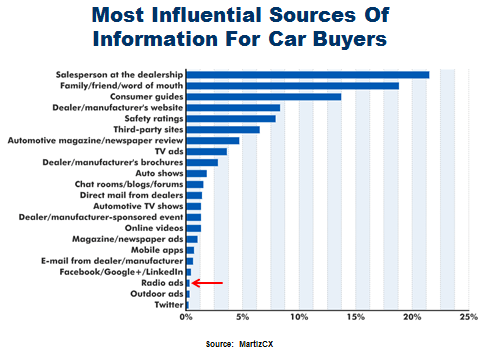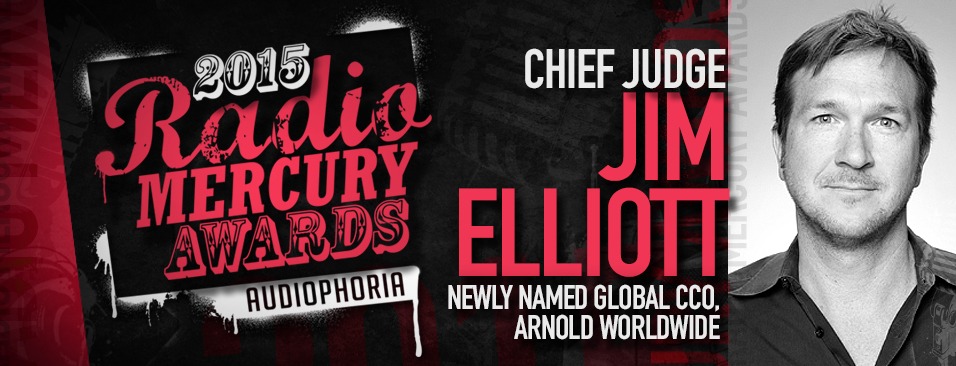Jim Elliott is probably a bit nervous. He’s the new chief judge for the 2015 Radio Mercury Awards, and he’s already anticipating the worst when it comes to radio ad submissions. Sadly, he has every right to have serious trepidations about the advertising he’s about to hear.
But before we get to his plight, let’s review some research about advertising in the all-important auto sector.
As we pointed out in a post last week, radio’s 2014 revenue results are very checkered. Spot revenue is down, digital is up, automotive still leads, but it continues to erode.
And a recent article in the Detroit News underscores radio’s increasingly rough road when it comes to cars and the dealerships that sell them. MaritzCX, a research and data company, conducts an annual survey among buyers of new vehicles. This year, more than 60,000 respondents completed their survey about the most trusted sources of new information when it comes to buying cars. And despite all the hype about using social media to sell products, Facebook and Twitter barely show up. As Lori Lewis will tell you, social media is not a great source for marketing cars, despite how many companies salivate over the idea of tapping into all those “likes” and “followers.”
It turns out the biggest influences are the dealership’s salesperson, word of mouth from family members or friends, and consumer guides. And only .4% point to social media as a major influencer, much to the chagrin of many digital marketers. But lost in this story is the poor performance of radio advertising – mentioned by just .3% of respondents for being informative.

Now I know what you’re thinking – who in their right mind would mention ads as influential sources for buying a car? But TV commercials actually do quite a bit better than radio (and we know how abysmal they are). In fact, radio only edges out outdoor advertising and Twitter – not a comfortable place to be on this marketing pecking order.
A big reason why radio does so poorly in this survey has to be attributable to the sad reality that radio ads just plain suck, and car dealership spots are often among the worst. Very few are memorable, clever, or the least bit helpful.
And beyond car ads, you’re hard-pressed to find any local radio advertising that is worth listening to. It’s just simply not a priority at most stations around the country. How do I know this?
Because the Mercury Awards has created not one, but two funny (or not so funny) “How Not To” videos of horrific – but common –radio advertising clichés they don’t want to hear when stations send in their entries. The aforementioned Jim Elliott who by day is the global chief creative officer for Arnold Worldwide, is behind this pre-emptive campaign, using the to-the-point hashtag #NoBadRadio. Here are his pleas to radio producers everywhere:
Email Recipients: Things We Don’t Want to Hear in a Radio Ad (Part 1) from Radio Mercury Awards on Vimeo
Email Recipients: Things We Don’t Want to Hear in a Radio Ad (Part 2) from Radio Mercury Awards on Vimeo
So this isn’t me or Jerry Del Colliano or Jerry Lee telling you radio ads are abysmal, absurd, banal, or just plain dumb. This is the Mercury Awards with their not-so-subtle request to broadcasters to step up their games and start producing ads that are creative, effective, and worth the listener’s time and the advertiser’s investment.
And Jim Elliott is sending his creative shot across the radio bow to submit better stuff. That’s all well and good for the awards program and you have to give him credit for trying to raise the bar (above ankle level) by exhorting radio broadcasters to do better.
We can talk about 93% reach all we like, as well as the other happy metrics that suggest that radio continues to be viable in the midst of unprecedented digital competition. But until radio broadcasters recommit to a sense of quality and purpose in the advertising that makes this entire industry possible, we’re going to keep ending up at the bottom of a lot of lists. And eventually, companies and the agencies that represent them will increasingly turn to other sources to get their messages across.
Radio stations and clusters don’t have the authority, the credibility, or the yank to improve most agency “creative” and other ads that are coming from who knows where. But it’s time to re-gain control of the controllable business – local advertising. It can be a difference maker for both the audience and hometown businesses that are competing for every dollar.
When it comes to radio ads, it’s time to stop sucking.
- What To Do If Your Radio Station Goes Through A Midlife Crisis - April 25, 2025
- A 2020 Lesson?It Could All Be Gone In A Flash - April 24, 2025
- How AI Can Give Radio Personalities More…PERSONALITY - April 23, 2025





Please remember, RADIO is also “Word of Mouth!” But, you message about commercials (and what often surrounds them) does resonate.
Appreciate it, Clark. Radio needs to do better.
The sad truth is that the overwhelming majority of radio ad revenue comes from some outside entity that is supplying the creative. And the lack of decent local production and copy writing dates waaaaay back to the first one to come up with the brilliant idea that sales people should write ad copy.
As cute as those bad radio examples are, the real problem goes something more like this:
If you’re looking for a great place to find __________, why not try ____________ located at at _____________? _____ has a great supply of _________________, ___________________ and even hard to find ______________. You’ll find the staff at ______ friendly and helpful no matter what you’re looking for. They’re open from _____ to _____, or visit them on the web at http://www._________. And be sure to like us on Facebook. For all your ________ needs, its __________ at ___________. Why not stop by todaY?
What I find amazing is that it doesn’t appear that one big company has even tried a beta test to see if better ad creative led to more sales (the spec spots would be better too) and/or more renewals.
Bob, it’s basic stuff but outside of gratuitously mentioning Jerry Lee, many do not take this issue seriously.
It not just about spot load. It is about the quality of commercials that fill those stopsets. Thanks for joining in.
WOW! Do these bring back memories. As a sales manager, I would fire/kill/strangle/mutilate ANYONE who stuck something this crappy on the air. Must admit, it’s very funny stuff though. And terrifying that things like this DO still pollute the airwaves.
Funny, perhaps but also sad that an esteemed award program like the Radio Mercury’s has to go these lengths to get out in front of some of these worn out approaches. Thanks for commenting.
I’ve been a Radio Mercury Awards judge for years. The audio disasters Jim skewers for the most part aren’t heard on RMA entries, but unfortunately ARE heard across this great land in all size markets. Staffs have been cut and there are very few production directors left. The ones who do remain have to crank out a zillion spots a day for clusters of stations.
Do I have solutions for this dilemma? Yes, and have presented seminars at RAB and NAB for years demonstrating them. Recently however, the seemingly brighter, shinier objects of digital are the subjects for those conferences.
I do continue to show clients and select broadcasters how to achieve remarkable results by crafting better commercials. More compelling messages have never stopped getting results for and renewals from advertisers.
Jeffrey, commercial production should not be a lost art. And while digital is attracting dollars, now more than ever, radio needs to prove its viability as an advertising medium. Thanks for the perspective on the Radio Mercury Awards, and I hope you receive some great entries this year. Thanks for commenting.
As a former radio creative director, I tried with all my might to instill within my sales force the importance of STRONG creative. 1.) How to keep listeners intrigued and entertained through the spot. 2.) How to keep listeners tuned in through the stopset back to music. All of these things equated ratings and revenue. I fought to keep the good off and only the great on, whether it came from my pen, or a sales rep’s. At this particular company where I was CSD in a (Top 50 market), anytime I pushed back and challenged sales to sell the creative better and the ideas of campaigns, it was almost always met with resistance. Basically, they had no time for quality, it was all about making budget, hitting goals, and whatever the client wanted… which was usually to write and produce THEIR OWN ad. Frustrated, I left and got back into programming and have utilized the same methods I used to write and conceive creative radio campaigns to carry listeners through quarter hours in the PPM world. So far, so good. Anyway, the point I’m making is that it’s hard to create great creative when not ALL are on board. Any pushback from production, is usually met with resistance from sales who need to get their money on the air immediately. Revisions, and persnickety production people (like I was), just get in the way of business in today’s world. Wish it wasn’t that way, and I fought tooth and nail over getting GREAT ads on the air, and avoiding crummy client-written, cliché-laden copy, but nine times out of ten, that copy made air, over my more creative material… some of which won local AIR Awards. #rantoff
Jack, thanks for the POV from the production studio, and it’s no shock why you ended up back on the air where you’re one of the best at connecting with audiences. As you suggest, it starts are the top – the market manager (or higher) making it a priority that commercial production is as compelling, creative, and effective as it can be – despite the obvious barrier and speed bumps. Appreciate the rant!
Thanks Fred. I think a lot of production guys just give up. Most have mouths to feed, and families to take care of, and at the end of the day for some… why bother? Some can’t care more than the company and why risk LOSING a job because your sales or general manager think you’re pushing back and they can promote some young part timer in that room who will do it THEIR way, and won’t give any lip. You have to have a leader who understands the VALUE of creative production, if you’re a TRUE creative director. Glad to contribute, thank YOU for the nice words. I enjoy your blog.
Thanks, Jack. The pressures of now make it paramount that sales gets the buy. In our transactional world, the results it generates and its effectiveness are tertiary at best.
It is about determining what really matters and that’s results and clients that keep coming back for more. It’s not that radio is less popular as an ad medium. It is about radio’s failure to make its case as a results medium. And that starts with the creative.
A few years back I made a proposal to Clear Channel:
-Give me a space at your Creative Services division.
-Give me a list of all businesses NOT using radio.
-I’ll create totally unique spec spots for them.
-You pay me nothing or just the local/state minimum wage.
-If it generates any new money just give me a very small percentage.
Their response:
Oh no, we couldn’t possibly do that.
Innovative solutions to longstanding problems are not going to come from doing business the way we’ve always done it. Thanks for the sad story, Marty.